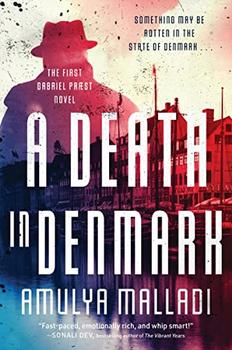Summary | Excerpt | Reviews | Beyond the Book | Readalikes | Genres & Themes | Author Bio

The First Gabriel Præst Novel
by Amulya Malladi
"I don't know," Elvira said.
"Will they take me away from my Far and Mor?" she asked.
Elvira gave her a hug then. "Don't worry about anything. You're going to Sweden and there are no Germans there."
They were already best friends—in the way only children could be. They spent that evening together and even slept side by side in the stables on the hay, whispering late into the night about what they'd do when the war was over.
"We can go to the town square and eat ice cream," Elvira said. "Or even go to the cinema. Wouldn't that be fun?"
Annemarie had agreed that it would be super fun.
They had barely fallen asleep when they heard loud sounds. Annemarie's mother told Elvira to run to her family in the house.
A German officer was asking everyone to stand in a line in German-accented Danish. Rough hands of soldiers pushed them around, shoving them against one another, squeezing them together.
It was cold and they were all shivering, all twenty of them and their hosts, as they stood in front of the main house.
There were ten soldiers surrounding the farm. Annemarie wondered how just ten men could control so many of them. Because they had guns, she thought. Each one of the soldiers was armed and pointing his weapon at them.
Lars, Helga, Ib, and Elvira had been separated from the Jews. Annemarie and Elvira looked at each other in mutual fear.
"I am Hauptsturmführer Fritz Diekmann," the soldier said. He was a handsome man, tall and lean with bright yellow hair, but his gray-blue eyes were hard. Turning to Lars, he continued in a calm, cold voice, "Is this your farm?"
"Yes," Lars said.
"And you're hiding Jews here," Captain Diekmann said.
"We have guests ... friends," Lars said.
"They are Jews," the German captain said tightly.
Annemarie knew that the Germans thought Jews were bad people. They made the word Jøde sound dirty. Tears filled her eyes, and she tightened her grip on her mother's waist.
"They are ... ," Lars began, but Captain Diekmann raised his hand to silence him. The Gestapo officer then turned and nodded at two soldiers who strode toward the Hansen family. He stared at the twenty Jews and said, "This is what happens to those who help you. I want you to know that this is your fault."
The two soldiers had handguns with them. They first shot Elvira and Ib in the head. Lars and Helga cried out but before they could rush to their children, the soldiers executed them with cold precision where they stood.
Annemarie couldn't scream. She cried in silent horror. Her new best friend was dead, and it was because of her.
The Jews were thrust into a truck that drove all night. When it stopped, they were herded into a crowd of Jewish captives waiting beside a long train. Annemarie heard whimpers and moans as each of the many cars was loaded with people. Babies were crying while mothers tried to shush them. Young children clutched the hands of their parents, wide-eyed with fear and fatigue.
They had no food or water. Annemarie didn't complain—it wasn't going to make a difference. They were more than fifty people squeezed into a small space; they took turns sitting down because there wasn't enough room.
For Annemarie it was all a blur.
The train started and stopped. Started and stopped. Started and stopped.
When they reached a place where they got out of the train, it was a relief. Annemarie didn't know where they were until a German soldier told the grown-ups. He spoke German and Annemarie couldn't understand him, but she heard whispers among the Danish Jews. They were in Theresienstadt. That name meant nothing to Annemarie.
The German soldiers barked out orders, and Annemarie's mother clung to her tightly. A soldier started to pull Annemarie away and she screamed for her mother.
Excerpted from A Death in Denmark by Amulya Malladi. Copyright © 2023 by Amulya Malladi. Excerpted by permission of William Morrow Paperbacks. All rights reserved. No part of this excerpt may be reproduced or reprinted without permission in writing from the publisher.
Your guide toexceptional books
BookBrowse seeks out and recommends the best in contemporary fiction and nonfiction—books that not only engage and entertain but also deepen our understanding of ourselves and the world around us.